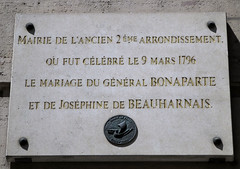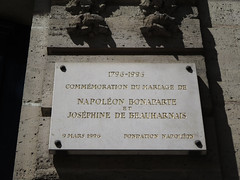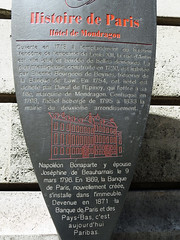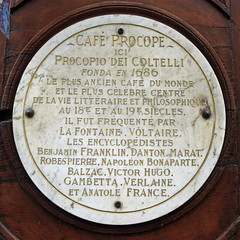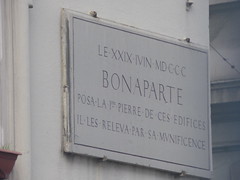Napoleon Bonaparte
Commemorated on 9 plaques
Du 22 Janvier au 3 Mars 1793 Napoleon Bonaparte Lieutenant-Colonel au 2me bataillon des volontaires Corses Logea dans cette maison qui avait appartenu a ses ancetres Jusqu en Mai 1721
English translation: From 22 January to 3 March 1793 Napoleon Bonaparte Lieutenant-Colonel to the 2nd Battalion of the volunteers Corses Logea in this house that had belonged to his ancestors Until May 1721 [AWS Translate]
Rue des Deux Empereurs, Bonifacio, Corsica, France where they lived (1793)
Mairie de l'ancien 2ème arrondissement. Où fut célébré le 9 mars 1796 le mariage du général Bonaparte et de Joséphine de Beauharnais.
English translation: Town hall of the former 2nd district. On 9 March 1796 General Bonaparte and Joséphine de Beauharnais were married. [AWS Translate]
3 rue d'Antin, Paris, France where they is commemorated
1796-1996 Commémoration du mariage de Napoléon Bonaparte et Joséphine de Beauharnais. 9 Mars 1996 Fondation Napoléon
English translation: 1796-1996 Commemoration of the marriage of Napoleon Bonaparte and Josephine de Beauharnais. 9 March 1996 Napoleon Foundation [AWS Translate]
3 rue d'Antin, Paris, France where they is commemorated
Hôtel de Mondragon. Ouverte en 1718 à l'emplacement du bastien Vendôme de l'enceinte de Louis XIII, la rue d'Antin est vite lotie et bord/eee de belles demeures. La plus prestigieuse, construite en 1720, est habitée par Etienne Bourgeois de Boynes, trésorier de la Banque de Law. En 1754, cet hôtel est acheté par Duval de l'Epinoy, qui l'offre à sa fille, Marquise de Mondragon. Confisqué en 1793, l'hôtel héberge de 1795 à 1833 la mairie du deuxième arrondissement. Napoléon Bonaparte y épouse Joséphine de Beauharnais le 9 mars 1796. En 1869, la Banque de Paris, nouvellement créée, s'installe dans l'immeuble. Devenue en 1871 la Banque de Paris et des Pays-Bas, c'est aujourd'hui Paribas.
English translation: Hôtel de Mondragon. Opened in 1718 to the site of the bastien Vendôme of the Louis XIII precinct, the Rue d'Antin was quickly subdivided and bordered by beautiful mansions. The most prestigious, built in 1720, was inhabited by Etienne Bourgeois de Boynes, Treasurer of the Bank of Law. In 1754, this hotel was bought by Duval de l'Epinoy, who offered it to his daughter, Marquise de Mondragon. Confiscated in 1793, the house held from 1795 to 1833 the town hall of the second arrondissement. Napoleon Bonaparte married Joséphine de Beauharnais here on March 9, 1796. In 1869, the newly created Banque de Paris moved into the building. Becoming in 1871 la Banque de Paris et des Pays-Bas, it is today Paribas.
3 rue d'Antin, Paris, France where they married (1796)
Café Procope. Ici Procopio dei Coltelli fonda en 1686 le plus ancien café du monde et le plus célèbre centre de la vie littéraire et philosophique au 18e et au 19e siècles. Il fut fréquenté par La Fontaine, Voltaire, les Encyclopédistes, Benjamin Franklin, Danton, Marat, Robespierre, Napoléon Bonaparte, Balzac, Victor Hugo, Gambetta, Verlaine et Anatole France.
English translation: Café Procope. Here Procopio dei Coltelli founded in 1686 the oldest café in the world and the most famous center of philosophical and literary life in the 18th and 19th centuries. It was visited by La Fontaine, Voltaire, Les Encyclopédistes, Benjamin Franklin, Danton, Marat, Robespierre, Napoléon Bonaparte, Balzac, Victor Hugo, Gambetta, Verlaine and Anatole France.
13 rue de l'Ancienne Comédie, Paris, France where they visited
1815-2015 Napoleon, Emperor of the French, was detained on HMS Bellerophon in Plymouth Sound from 26 July to August 1815. Large crowds came to catch a glimpse of him. These two blocks of granite are from Dartmoor Prison, where thousands of French prisoners were held captive during the Napoleonic Wars. Embedded, is a volcanic stone from Longwood House in St Helena where Napoleon died on 5th May 1821.The stones stand here to celebrate 200 years of peace between the United Kingdom and France. May our heats be open to friendship and our arms reach across the sea to unite our two nations.
Plymouth Hoe, Plymouth, United Kingdom where they was detained (1815)
LE XXIX JUIN MDCCC BONAPARTE POSA LA 1ERE PIERRE DE CES EDIFICES IL LES RELEVA PAR SA MUNIFICENCE
English translation: THE 29 JUNE 1800 BONAPARTE LAID THE 1st STONE OF THESE BUILDINGS IT RAISED THROUGH HIS MUNICIPALITY
Rue Colonel Chambonnet, Lyon, France where they laid the stone (1800)
Ici s'élevait le château puissant dans lequel deux jours avant Waterloo, Napoléon 1er, empereur des Français, établit son quartier général la nuit du 15 Juin 1815.
English translation: Here stood the powerful castle in which two days before Waterloo, Napoleon 1st, emperor of the French, established his headquarters on the night of June 15, 1815. [AWS Translate]
Rue de Charleville, Charleroi, Belgium where they had its headquarters (1815)
The Waterloo Way Broadstairs On Sunday 18th June 1815 the Anglo-Dutch army under the command of the Duke of Wellington and the Prussian army led by Field Marshal Gebhard Leberecht von Blücher defeated Napoleon Bonaparte's army at the Battle of Waterloo eight miles south of Brussels in Belgium. This victory was a defining moment in European history. The official dispatch with the news of the victory was carried to England by The Honourable Major Henry Percy, 14th Light Dragoons, an aide de camp to the Duke of Wellington. He travelled by post chaise from Brussels to Ostend where he joined His Majesty's Ship Peruvian, under the command of Commander James White, Royal Navy, which then sailed for England. Landing at Broadstairs on 20th June, Major Percy and Commander White left immediately for London by post chaise. Broadstairs | Sarre | Canterbury | Faversham | Sittingbourne | Rochester | Dartford Grosvenor Square St James's Square Unveiled By Councillor Rosalind Binks, Mayor Of Broadstairs And St. Peter's On 20 June 2015 To inaugurate The Waterloo Way from Brussels to London in honour of all those who fought at Waterloo.
Eagle House, The Parade, Broadstairs, United Kingdom where they was



